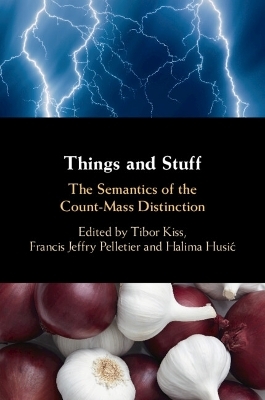
Things and Stuff
Cambridge University Press (Verlag)
978-1-108-93282-0 (ISBN)
A classical viewpoint claims that reality consists of both things and stuff, and that we need a way to discuss these aspects of reality. This is achieved by using +count terms to talk about things while using +mass terms to talk about stuff. Bringing together contributions from internationally-renowned experts across interrelated disciplines, this book explores the relationship between mass and count nouns in a number of syntactic environments, and across a range of languages. It both explains how languages differ in their methods for describing these two fundamental categories of reality, and shows the many ways that modern linguistics looks to describe them. It also explores how the notions of count and mass apply to 'abstract nouns', adding a new dimension to the countability discussion. With its pioneering approach to the fundamental questions surrounding mass-count distinction, this book will be essential reading for researchers in formal semantics and linguistic typology.
Tibor Kiss has been Professor of Theoretical and Computational Linguistics at Ruhr-Universität Bochum since 1999. He is also co-editor (with Artemis Alexiadou) of Syntax: Theory and Analysis (2015), and wrote a various papers on problems of the syntax-semantics interface, dealing with quantification and word order, prepositions, non-finite complements, and relative clauses. Francis Jeffry Pelletier has been a joint professor of philosophy, linguistics, and computing science, as well as a Canada Research Chair in cognitive science. He is also a Fellow of the Royal Society (Canada). Notable publications include Mass Terms: Some Philosophical Problems (editor, 1979) and The Generic Book (co-edited with Gregory Carlson, 1995). Halima Husić is a Postdoctoral Research Associate at the Linguistics Data Science Lab, Ruhr-Universität Bochum. Her work has focused on semantics including event nominals, definiteness, and the semantic effects of case alternation. In her recently completed dissertation, she discusses the countability of abstract nouns.
1. Editorial Introduction: Background to the Count-Mass Distinction Franics Jeffry Pelletier, Tibor Kiss and Halima Husić; 2. Mass vs Count: Where Do We Stand? Outline of a Theory of Semantic Variation Gennaro Chierchia; 3. Counting, Plurality and Portions Susan Rothstein; 4. Count/Mass Asymmetries: The Importance of Being Count Jenny Doetjes; 5. Divide and Counter Hagit Borer and Sarah Ouwayda; 6. Mass to Count Shifts in The Galilee Dialect of Palestinian Arabic Christine Hnout, Lior Laks and Susan Rothstein; 7. Object Mass Nouns as an Arbiter For The Mass/Count Category Kurt Erbach, Peter Sutton and Hana Filip; 8. Bare Nouns and the Mass-Count Distinction: A Pilot Study Across Languages Kayron Bevilaqua and Roberta Pires de Oliveira; 9. Counting (on) Bare Nouns: Revelations from American Sign Language Helen Koulidobrova; 10. Ontology, Number Agreement and the Mass-Count Distinction Alan Bale; 11. The Semantics of Distributed Number Myriam Dali and Éric Mathieu; 12. Container, Portion and Measure Interpretations of Pseudo-Partitive Peter Sutton and Hana Filip; 13. Overlap and Countability in Exoskeletal Syntax: A Best-Of-Both-Worlds Approach to the Mass/Count Distinction Hanna de Vries and George Tsoulas; 14. The Role of Context and Cognition in Countability: A Psycholinguistic Account of Lexical Distributions Francesca Franzon, Giorgio Arcara and Chiara Zanini; 15. Plurality Without (Full) Countability: On Mass- Like Categories in Lexical Plurals Constructions Peter Lauwers; 16. Determining Countability Classes Scott Grimm and Aeshaan Wahlang; 17. Polysemy and the Count/Mass Distinction: What Can We Derive from a Lexicon of Count and Mass Senses? Tibor Kiss, Francis Jeffry Pelletier, and Halima Husić.
| Erscheinungsdatum | 25.07.2023 |
|---|---|
| Zusatzinfo | Worked examples or Exercises |
| Verlagsort | Cambridge |
| Sprache | englisch |
| Gewicht | 635 g |
| Themenwelt | Schulbuch / Wörterbuch ► Wörterbuch / Fremdsprachen |
| Geisteswissenschaften ► Sprach- / Literaturwissenschaft ► Sprachwissenschaft | |
| ISBN-10 | 1-108-93282-7 / 1108932827 |
| ISBN-13 | 978-1-108-93282-0 / 9781108932820 |
| Zustand | Neuware |
| Informationen gemäß Produktsicherheitsverordnung (GPSR) | |
| Haben Sie eine Frage zum Produkt? |
aus dem Bereich


